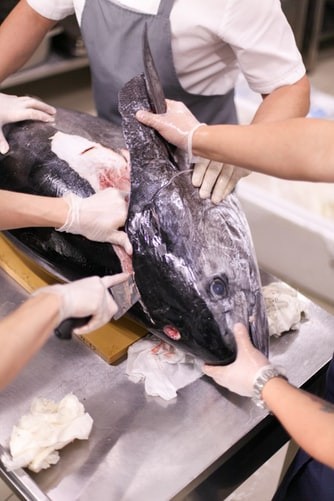
From the basic tuna sandwich to the expertly prepared serving of sashimi and everything else in between, it's undeniable that tuna is a food item present in many modern cultures. It is then safe to assume that tuna has a strong worldwide demand, and it's created a looming danger for us all.
Since World War II (WWII), there has been a steady rise in the demand for canned fish, and tuna is right at the top of this list. According to a study published in Fisheries Research, tuna fishing has increased by a whopping 1000% in the last 60 years. Studies into industrial catches have shown that 6 million tons of tuna are harvested annually, and this is a figure that scientists say is unsustainable.
Government subsidies awarded to industrial fisheries have also had a great impact on this unsustainability. Tuna fishing on an industrial scale now covers the majority of oceans across the world.
And we don't have anywhere else to fish. Angie Coulter, lead author of the study and a researcher at the University of British Columbia working on the Sea Around Us Initiative said that, "Tuna fisheries have expanded into every region we can possibly exploit. There are no new fishing grounds to explore, and we are catching fish at the highest rate that we can."
Global Tuna Conservation Project Director Shana Miller says, "Everywhere tuna swim, they're being pursued by industrial fisheries." Miller advocates for international catch limits and regulation of destructive fishing gear. Measures like these will allow the tuna to repopulate and could lead the world toward sustainable tuna fishing and consumption.
The threat of tuna's extinction is not only a danger in terms of a missing menu item; it will inevitably create an economic crisis on a global scale. Several communities and even sovereign nations depend on it as an economic resource.
The threat is very real. In the 1960's, for example, the Indian Ocean yielded 36% bluefin tuna from the total tuna catch. Now it accounts for only 1%. This is not migration; this is extinction.
In addition, the possible extinction of tuna also upsets the ecosystems that they inhabit. Larger fish prey on tuna and tuna themselves are predators to smaller fish and invertebrates, a natural balance that is steadily being overturned by the 1000% boom in tuna consumption.
Bycatches also pose a threat to the ecosystem. Between 1950 and 2016, close to 6 million metric tons of shark were documented and discarded as bycatches. Coulter adds, "Sharks are apex predators. They hold all these food chains together. If we're removing these sharks, they really can't catch up and will decline more and more."
While Coulter's suggestion of international catch limits and fishing gear regulations may be the most effective ways to bring us further away from tuna's extinction, they will also take time to be approved by the appropriate governing bodies. Implementation also poses a challenge. It seems then that what is needed at the moment is to taper the public demand for tuna, canned or otherwise, at least for the moment.
© 2026 ScienceTimes.com All rights reserved. Do not reproduce without permission. The window to the world of Science Times.












